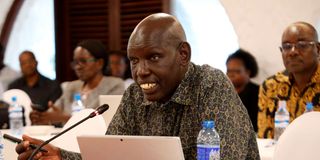Over 3.5 million learners to sit national exams this year

Basic Education Principal Secretary Belio Kipsang addresses members of the Parliamentary Committee on Education at the Sun and Sand Hotel in Kilifi on September 20, 2023.
More than 3.5 million candidates will sit for national examinations this year, including the Kenya Primary School Education Assessment (KPSEA), the Kenya Certificate of Primary Education (KCPE) and the Kenya Certificate of Secondary Education (KCSE). This is the highest number of candidates ever registered in the country.
“Just under a million will sit for KCSE this year, 1.4 million for KCPE and 1.2 million for KPSEA,” Basic Education Principal Secretary Belio Kipsang said yesterday.
Dr Kipsang explained that, when the Ministry of Education analysed KCPE data, it realised that many people had registered.
“We have almost 300,000 additional learners, some of whom are adults, who registered as private candidates,” he said.
This comes as the Ministry of Education is revising the grading system to focus on learners' competencies, skills and knowledge. This year’s candidates will be the first cohort to benefit from the new grading system in line with recommendations made by the Presidential Working Party on Education Reforms (PWPER).
Dr Kipsang said the PWPER recommended separating placement from testing to gauge what children have learnt.
The new grading will benefit at least five cohorts under the defunct 8-4-4 system.
Dr Kipsang told the National Assembly Education Committee that is chaired by Tindiret MP Julius Melly the new grading system will enable learners to pursue their dream courses.
Meanwhile, the Education and Interior ministries have started putting in place measures to ensure the smooth running of the national examinations, which will begin on October 30 and end in November.
“We are checking whether our officers have adequately prepared our children, which we are sure they have done. The teachers have done a fantastic job and we believe our children are ready for the exams. This is our last KCPE as we are fully transitioning to the Competency Based Education at primary level," Dr Kipsang said when he met Education field officers including those from the Teachers Service Commission.
“We want to get our children out of the 8-4-4 system and that leaves us with five cohorts that will still be doing KCSE. That was part of our discussion with the committee,” said Dr Kipsang.
Dr Kipsang said learners will be tested on the knowledge, skills, competencies, values and attitudes they would have acquired in their schooling.
"This is certification. Globally, there are two critical things in education; literacy and numeracy," he said, further explaining that, if a person can read, write, add, subtract, multiply or subtract, one can apply this knowledge to everything else in life.
In the new grading system, the two critical areas the Education ministry will look at when certifying learners include numeracy (mathematics) and literacy (Kiswahili or English).
Numeracy will be compulsory for every learner. The MoE will assess learners in seven subjects.
"It should be about the best of what you've acquired from the learning areas. Two sciences, one humanities, numeracy, literacy and other subjects. For a long time, we have disadvantaged our children, that is why our transition to university is between 17 and 19 per cent, while our neighbours are at 36 to 40 per cent," the PS said.
Regarding the El Niño rains, the PS said the government has taken measures to ensure that it does not disrupt exams.
"All areas that may be affected by flooding are being mapped. We are mobilising all government equipment including our helicopters from the military, Kenya Police Service, Kenya Forestry Service, and Kenya Wildlife Service. We are taking measures to ensure that the rains do not disrupt the exams,” he added.





